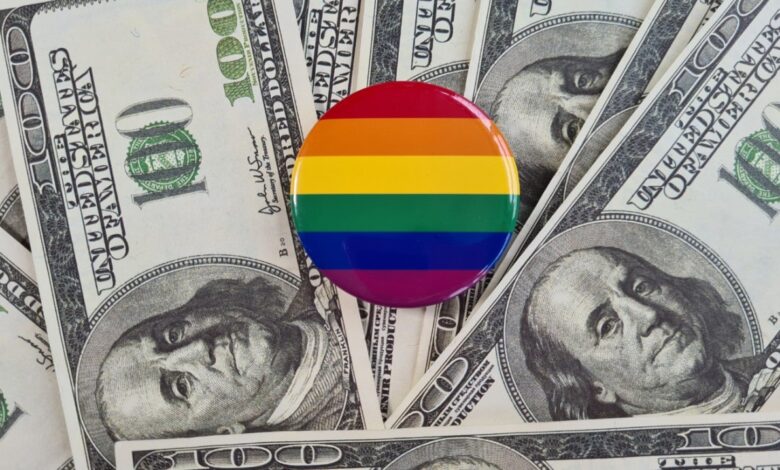The cost of hate: Anti-LGBTQ laws are bad for business

So far in 2023, more than 491 anti-LGBTQ bills have been introduced in local legislatures across America. Bills range from requiring teachers to tell parents if students ask to be called by different names or pronouns to banning books and drag shows to prohibiting gender-affirming medical care for minors. The majority target the trans community — arguably one of the most vulnerable communities in our country.
Although these bills continue to increase in number, American popular sentiment is increasingly in favor of the LGBTQ community. Twenty-one percent of Gen Zers identify as LGBTQ, according to one survey. A recent Gallup poll shows that 71 percent of Americans support same-sex marriage. And 64 percent favor policies that protect the transgender community from discrimination regarding jobs, housing and public spaces, according to Pew (though its numbers are more divided when it comes to discussion of trans health care).
The politicians proposing these laws claim they’re defending parents and children, but they certainly aren’t in the best interest of my family: my husband of 17 years and our son. They’re also not in the best interest of America, the values our country was built on or the innovation that has flourished because of those values.
Innovation is America’s hallmark and sets us apart from the rest of the world. Laws that limit individual American freedoms will limit our capacity to retain our position as a global leader in innovation. Here’s why:
Innovation is America’s greatest competitive advantage
Although not the largest country in the world, America has sat at the top of the global economy for quite some time now. The United States has the largest economy in the world, with China just a few trillion behind us.
However, U.S. population growth has slowed to a trickle, growing just 0.1 percent in 2021 due to lives lost to the pandemic, the overdose crisis and a slowing birth rate. Some, like Justin Yifu Lin, former chief economist of the World Bank, have argued that China’s larger population will eventually lead to its economy growing to double the size of the United States’s.
Given that population size is not likely to dramatically increase in the future, the United States will have to rely on innovation to retain our competitive advantage in the face of other economic powers. The way we stay ahead of the curve is by always looking for ways to innovate.
On the Global Innovation Index for 2022, the United States ranks first in the world on 15 out of 81 innovation indicators, including research and development (R&D) investors, venture capitalist investors, quality of universities, quality and impact of scientific publications, number of patents by origin, and computer software spending. Of the five companies spending the most on R&D in the world, four of them are in the United States (Amazon, Alphabet, Microsoft and Apple).
If we want to maintain this top position, we need all hands on deck. Having a society that is more exclusionary toward certain groups of people will only stifle their capacity to contribute to entrepreneurial discovery.
Protecting LGBTQ employees fosters innovation
We have strong evidence that diverse teams lead to better business results. In 2018, Deloitte released its diversity and inclusion report, demonstrating that organizations with more inclusive cultures were two times more likely to meet or exceed their financial targets, three times more likely to be high performing, six times more likely to be innovative and agile, and eight times more likely to achieve better business outcomes. It’s hard to argue with the business benefits of diversity.
Not only that, but when inclusive leadership is present, there’s a heightened feeling of psychological safety, inspiration, collaboration, quality of decision-making and team performance. Considering that 82 percent of employees say that it’s important for their organization to “see them as a person,” this all makes a lot of sense.
True innovation comes from the freedom to fully express yourself and step outside of prescribed boxes. If you work in an environment where you know you’re accepted for who you are, you’re going to be better all around. You’ll be healthier and happier, you’ll bring your whole self to work, and you will be true to yourself. This is when creativity thrives.
What I find most compelling, however, is that companies with LGBTQ-supportive policies that invest in R&D departments have been proven to perform better than those without LGBTQ-supportive policies. All signs point to supporting and including the LGBTQ community as an investment in the success of the future.
Anti-LGBTQ legislation will hinder future innovation
Proposing laws that will hinder innovation by further oppressing the LGBTQ community is a slap in the face to those LGBTQ innovators who have shaped and are shaping entire industries. Do an internet search for “LGBTQ Innovators” and you’ll see names like Alan Turing, Tim Cook, Chris Hughes, Martine Rothblatt and Vivienne Ming, to name just a few. These are incredible leaders and innovators who have changed the way we all experience technology and, in turn, our world.
When thinking about the consequences of the U.S. continuing down this path of trying to outlaw the experiences of the trans and larger LGBTQ community, I see two possibilities.
On the one hand, it’s going to silo innovation into states that are more liberal in their laws. Between 2006 and 2016, LGBTQ entrepreneurs who moved from less inclusive places to more inclusive places created 3 million jobs. After the pandemic made remote work a widespread possibility, people migrated away from the coasts and toward middle America and Florida — places that tend to be more conservative-leaning. However, we could see that migration being reversed with the rise of hateful laws passing.
On the other hand, the psychological burden these laws place on the shoulders of the LGBTQ community will hinder the level of innovation we would otherwise be capable of. Vivienne Ming has done research into the “tax” that is imposed on the professional lives of those of us who are different. This tax takes its toll on people. Further, according to a recent study, 46 percent of LGBTQ workers have received unfair treatment on the job due to their sexual orientation or gender identity. This type of treatment is only going to increase with oppressive legislation. If it does, net innovation is going to fall as LGBTQ innovators will be hard pressed to perform at their best when they’re also trying to navigate a hostile work environment.
The LGBTQ community is diverse, vibrant, creative, innovative and resilient — characteristics any entrepreneur should want on their team. Passing laws that hinder our community from thriving is only going to result in greater and longer-term consequences for our country. Conservative lawmakers should tread carefully, and advocates and allies alike should fight like hell to bring an end to this dangerous discrimination.
Bryan Janeczko, a serial social entrepreneur, is co-founder of StartOut, the leading non-profit accelerator helping LGBTQ members launch businesses. He is also CEO and co-founder of Nunbelievable, a baked snack goods company fighting hunger in America, and a board member of cultural consultancy Sparks & Honey.
Copyright 2023 Nexstar Media Inc. All rights reserved. This material may not be published, broadcast, rewritten, or redistributed.





